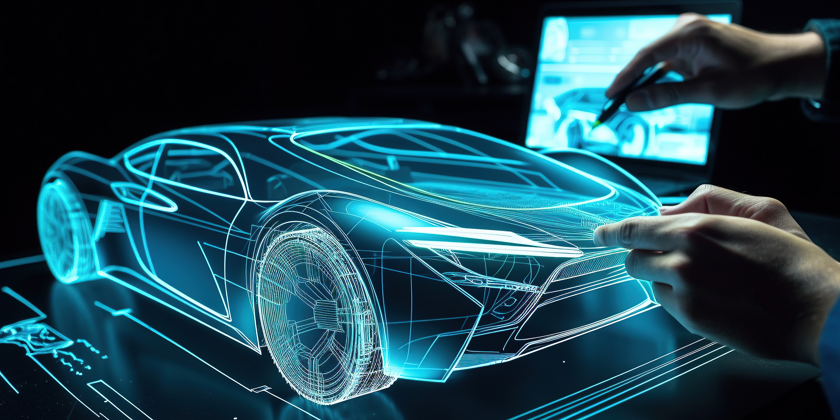Groundbreaking technologies have always played a pivotal role in shaping the trajectory of industries, and the automotive sector is no exception. In a realm where the generation of energy for transportation relies heavily on unsustainable fossil fuels, the transition to electric vehicles looks promising. Amid their potential, significant obstacles loom, from limited battery range and long charging durations to the need for a robust electric ecosystem.
There is no denying that the future is electric but it is not a future that can exist without AI for its implementation can significantly enhance the safety, reliability, and economic feasibility of EVs—forming the bedrock for their broader acceptance. With this newfound intelligence, existing titans and new manufacturers in the industry have joined the race for EV sales. Concurrently, the growing consumer interest in EVs can also be attributed largely to the advent of new charging infrastructure, intuitive UI, awareness of environmental benefits, increase in EV performance, better designs, and the reduced cost of EV battery packs.
Let’s explore how AI affects the future of EVs:
Predictive Maintenance: The advent of AI brings forth predictive maintenance, enabling EVs to stay in optimal condition and prevent breakdowns. AI algorithms can use sensor data and real-time car metrics to anticipate issues and extend the lifespan while reducing repair costs. An exemplification of such integration is evident in BMW’s approach. Their EVs utilize AI to predict maintenance requirements by identifying anomalies and recommending timely upkeep measures. This assures EV owners that their vehicles are consistently performing at optimal levels across the board.
Smart Energy Control: EVs are a fusion of multiple technologies culminating into a functional vehicle. Every aspect of this amalgamation requires electricity to work. Without the right energy management system, the battery’s reserves will be depleted in no time. AI is the perfect solution to manage these parameters, which include optimizing air conditioning system, modulating engine power output and recommending the most energy-efficient route. This synergy ensures that every tool is working to its fullest potential, balancing every component’s efficacy and extending the overall driving range.
Battery Optimization: One of the EV industry’s biggest challenges is creating safer batteries that recharge faster and last longer. Leveraging machine learning, each drive yields vital data that can be used to predict optimal charging patterns grounded on driver behavior and road conditions. This ensures that EV batteries function at their peak, rendering range anxiety a thing of the past. For instance, Tesla employs AI to optimize its EV charging process, predicting charging durations and energy requirements with tremendous accuracy. At the opposite end of the spectrum, Toyota is employing advanced analytics to engineer batteries that are poised to outlast their current counterparts by a staggering 15-fold.
Advanced Safety: The journey toward EV advancement is intrinsically intertwined with driver security, and AI lends a transformative hand in augmenting safety features. Equipped with AI-powered sensors and cameras, EVs harness real-time data analytics to detect potential hazards, identify obstructions, and monitor their surroundings to avert collisions. Volvo stands as a prime example of this innovation. The company integrates AI-powered collision avoidance systems that identify obstacles, pedestrians and cyclists, issuing timely alerts or triggering automated corrective measures to steer clear of imminent collisions.
Autonomous Driving: The allure of autonomous driving has long fired our imaginations, and AI stands as the cornerstone propelling this vision closer to reality. To achieve this, self-driving vehicles must be able to navigate traffic, prevent accidents and optimize routes. Leading the charge in creating autonomous EVs is Waymo, an Alphabet Inc. subsidiary. The company’s AI framework seamlessly combines human-like decisions with the precision of data analytics, enabling seamless navigation through complex traffic scenarios such as highway merges and lane changes—all without the need for manual interventions. While we may not witness this feat on the road any time soon, the day when AI takes the wheel is undeniably drawing nearer.
In this ever-evolving landscape, AI is steering incredible shifts in the EV industry and revving up the core of electric mobility. By merging AI with EV designs, we are shifting into high gear, making today’s exceptional technology the fuel for tomorrow’s journey. It’s not just about engineering marvels; the mass adoption of EVs ensures that every mile cruised is a joy ride toward a greener future. The next time your vehicle roars into life, it will demonstrate an intuitive grasp of your driving needs like a GPS in tune with your thoughts. That’s the signal that the new era of intelligent transportation has pulled into the station. We don’t need a ghost in the machine to see this future; it’s all turbocharged by the horsepower of AI.

